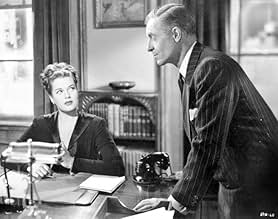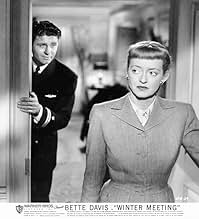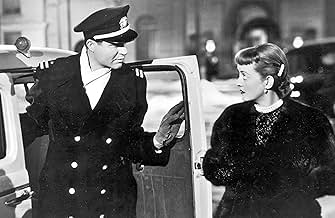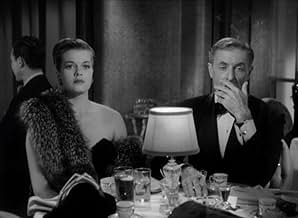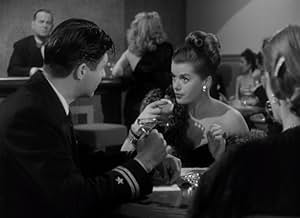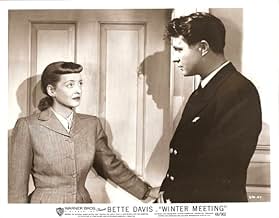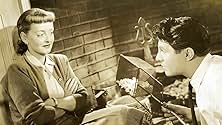AVALIAÇÃO DA IMDb
6,2/10
1,6 mil
SUA AVALIAÇÃO
Adicionar um enredo no seu idiomaBette Davis is a successful poetess who falls in love with a war hero in this romantic melodrama that is a moving film experience any time of year.Bette Davis is a successful poetess who falls in love with a war hero in this romantic melodrama that is a moving film experience any time of year.Bette Davis is a successful poetess who falls in love with a war hero in this romantic melodrama that is a moving film experience any time of year.
- Direção
- Roteiristas
- Artistas
Jim Davis
- Slick Novak
- (as James Davis)
Woody Herman
- Leader - Woody Herman and His Orchestra
- (as Woody Herman and His Orchestra)
Lois Austin
- Marcia
- (não creditado)
Tex Brodus
- Restaurant Patron
- (não creditado)
Gertrude Carr
- Woman on Subway
- (não creditado)
Steve Carruthers
- Restaurant Patron
- (não creditado)
Douglas Carter
- Waiter
- (não creditado)
Hugh Charles
- Headwaiter
- (não creditado)
Russ Clark
- Man in Cafe
- (não creditado)
Franklyn Farnum
- Restaurant Patron
- (não creditado)
Bess Flowers
- Restaurant Patron
- (não creditado)
Charles Fogel
- Restaurant Patron
- (não creditado)
- Direção
- Roteiristas
- Elenco e equipe completos
- Produção, bilheteria e muito mais no IMDbPro
Avaliações em destaque
It takes good critiquing skills to fully appreciate the surprisingly seductive subtleties of Bette Davis during her motion picture making prime. Winter Meeting is an intellectual's & critic's delight. Davis doesn't ever step out of her leading role as an extremely constrained character, Susan Greive. I can't find a flaw in her meticulous performance. The story is also of interest to the period when it was filmed.
Bette Davis at 40yo & 59 films into the height of her acting career, stars as an accomplished, upscale poet, Susan Grieve. Although Grieve is well traveled from soliciting her literary work, she resides in a posh brownstone in NYC. Her closest friend & confidant is an old-monied dapper gentleman, complete with the social graces of exquisitely good taste, Stacy Grant (43yo John Hoyt).
Believing that his secretary Peggy Markham (Janis Paige) will seduce a visiting war hero, Slick Novak (James Davis), Grant arranges a dinner party for the foursome, including the very reserved & demure Grieve (Davis). Instead, Novak instantly falls for the ever so proper poet who has no romantic interests.
After Grieve & Novak engage in a private romance, she's romantically awakened in a way that she's never been before. As such, Grieve is falling in love with Novak. Something has to go wrong to upset as fine a romance as theirs, doesn't it? It always does....
This film offers no exception. Novak has a closely guarded secret that he discloses to Grieve that changes everything between them.
I found the best on-screen chemistry to be between Davis & Hoyt. Davis comes off as the kind of woman who enjoys being around elegant men who aren't hounding after women; perhaps even gay men. Hoyt fits that image to a T. Their ultra close friendship is worth more than any romance~
Bette Davis at 40yo & 59 films into the height of her acting career, stars as an accomplished, upscale poet, Susan Grieve. Although Grieve is well traveled from soliciting her literary work, she resides in a posh brownstone in NYC. Her closest friend & confidant is an old-monied dapper gentleman, complete with the social graces of exquisitely good taste, Stacy Grant (43yo John Hoyt).
Believing that his secretary Peggy Markham (Janis Paige) will seduce a visiting war hero, Slick Novak (James Davis), Grant arranges a dinner party for the foursome, including the very reserved & demure Grieve (Davis). Instead, Novak instantly falls for the ever so proper poet who has no romantic interests.
After Grieve & Novak engage in a private romance, she's romantically awakened in a way that she's never been before. As such, Grieve is falling in love with Novak. Something has to go wrong to upset as fine a romance as theirs, doesn't it? It always does....
This film offers no exception. Novak has a closely guarded secret that he discloses to Grieve that changes everything between them.
I found the best on-screen chemistry to be between Davis & Hoyt. Davis comes off as the kind of woman who enjoys being around elegant men who aren't hounding after women; perhaps even gay men. Hoyt fits that image to a T. Their ultra close friendship is worth more than any romance~
In many ways, this film is a nice departure from the typical Bette Davis film. Having her play a not particularly attractive spinster who is reluctant in love is a nice idea. For once, the "plain Jane" in the film gets the man while the sexy vamp is left in the cold--and I appreciate this. Plus, the film talks a lot about psychological motivations and struggles--as both leads are extremely screwed up and are emotionally "stuck". However, despite these decent story ideas, the film manages to never really hit the mark. This is possibly due to the film packing in too many plot points, or it might be because the film ends on a down note or it could be because the male lead was an unknown and didn't especially distinguish himself. All I know is that the film did keep my attention but I just never felt satisfied by much of it--except the final phone call Bette makes as the film concludes.
For huge Davis fans like myself, it's worth seeing. For those who aren't, please try some of her great films first--she was an amazing and great actress and this movie might give you the impression she was just ordinary.
Two final observations. First, in a cliché that I hate but is present in so many films, a round of drinks is bought and no one really drinks any of it! If I were paying about $5 a drink, I'd be sure to drink mine AND I might be tempted to drink all the other drinks--after all, this costs money!! Second, if you see the film, watch John Hoyt's performance and then ask yourself if this role didn't seem exactly the sort you'd normally see Clifton Webb play. It's got "Webb" written all over it!
For huge Davis fans like myself, it's worth seeing. For those who aren't, please try some of her great films first--she was an amazing and great actress and this movie might give you the impression she was just ordinary.
Two final observations. First, in a cliché that I hate but is present in so many films, a round of drinks is bought and no one really drinks any of it! If I were paying about $5 a drink, I'd be sure to drink mine AND I might be tempted to drink all the other drinks--after all, this costs money!! Second, if you see the film, watch John Hoyt's performance and then ask yourself if this role didn't seem exactly the sort you'd normally see Clifton Webb play. It's got "Webb" written all over it!
Bette Davis and Jim Davis have a "Winter Meeting" in this 1948 film about a spinster poetess and a heroic soldier. Based on a novel, it's an odd choice for a film, as it concerns two people wrestling with their inner selves. Both of them are carrying baggage, and each tries to help the other. That kind of scenario doesn't lend itself to the big screen.
There is a Waldo Lydecker character, this time named Stacy Grant, played by John Hoyt. He's the classy closet homosexual full of wit and vinegar who first introduces Susan (Bette) to Slick (Jim Davis), though he has invited his secretary (Janis Paige) as Slick's date. A morose man who obviously doesn't feel much like a war hero, Slick is interested in Susan, and the two begin a romance. She takes him to her house in Connecticut, a place filled with bad memories for her. There, the two fall in love and each discovers what's really bothering the other.
This is a slow moving film filled with dialogue - the lines almost outnumber the cigarettes. We're not used to dialogue anymore - it doesn't leave enough time for the special effects. What's off-kilter in this movie is the direction and the inexperience of Jim Davis, who later would achieve great fame as Jock Ewing on "Dallas." People on this board have said Bette Davis cringed during their love scenes, why did she agree to have him as her co-star, etc. First of all, she was crazy about him as a person and wanted to help him in his career, though that never materialized. I think I remember reading he went to Korea or something and when he got back, she'd never heard of him, though he did have an autographed photo of her as proof that he knew her. Secondly, Bette Davis was not Katharine Hepburn. Hepburn liked to surround herself with the best of the best; Davis, as she grew older, became more insecure and eventually wanted people around her she could cow. She hadn't quite reached that stage yet in "Winter Meeting," but we can see the early signs. She was on her way out at Warners and wasn't given a strong director who really could have pulled this together.
Despite this, Davis gives a very restrained performance; she's excellent. The problem is, why would a returning soldier be interested in her when he has Janis Paige hanging all over him? It stretches credibility. Paige here looks like a cross between a young Jane Fonda and Teri Hatcher - she's gorgeous. Davis looks like the atypical 1940s spinster aka career woman - tailored clothes and severe haircut. Pre-code career women had so much more fun - they dated, they went to bed with men, and they looked good. Then somebody decided it wasn't moral, and all girls should be married, and if you aren't, you'll end up frustrated and wearing suits like Davis wears in this. One can understand a serious young man like Slick being attracted to Davis' intelligence, and if she had looked the way she looked later on in the film (apparently after they had sex), one could have bought it so much more easily.
"Winter Meeting" is worth seeing for a wonderful Davis performance and the thought-provoking character studies. Though awkward at times, it's nevertheless interesting, and one does care about both of the main characters. You can't say that about some of the films today.
There is a Waldo Lydecker character, this time named Stacy Grant, played by John Hoyt. He's the classy closet homosexual full of wit and vinegar who first introduces Susan (Bette) to Slick (Jim Davis), though he has invited his secretary (Janis Paige) as Slick's date. A morose man who obviously doesn't feel much like a war hero, Slick is interested in Susan, and the two begin a romance. She takes him to her house in Connecticut, a place filled with bad memories for her. There, the two fall in love and each discovers what's really bothering the other.
This is a slow moving film filled with dialogue - the lines almost outnumber the cigarettes. We're not used to dialogue anymore - it doesn't leave enough time for the special effects. What's off-kilter in this movie is the direction and the inexperience of Jim Davis, who later would achieve great fame as Jock Ewing on "Dallas." People on this board have said Bette Davis cringed during their love scenes, why did she agree to have him as her co-star, etc. First of all, she was crazy about him as a person and wanted to help him in his career, though that never materialized. I think I remember reading he went to Korea or something and when he got back, she'd never heard of him, though he did have an autographed photo of her as proof that he knew her. Secondly, Bette Davis was not Katharine Hepburn. Hepburn liked to surround herself with the best of the best; Davis, as she grew older, became more insecure and eventually wanted people around her she could cow. She hadn't quite reached that stage yet in "Winter Meeting," but we can see the early signs. She was on her way out at Warners and wasn't given a strong director who really could have pulled this together.
Despite this, Davis gives a very restrained performance; she's excellent. The problem is, why would a returning soldier be interested in her when he has Janis Paige hanging all over him? It stretches credibility. Paige here looks like a cross between a young Jane Fonda and Teri Hatcher - she's gorgeous. Davis looks like the atypical 1940s spinster aka career woman - tailored clothes and severe haircut. Pre-code career women had so much more fun - they dated, they went to bed with men, and they looked good. Then somebody decided it wasn't moral, and all girls should be married, and if you aren't, you'll end up frustrated and wearing suits like Davis wears in this. One can understand a serious young man like Slick being attracted to Davis' intelligence, and if she had looked the way she looked later on in the film (apparently after they had sex), one could have bought it so much more easily.
"Winter Meeting" is worth seeing for a wonderful Davis performance and the thought-provoking character studies. Though awkward at times, it's nevertheless interesting, and one does care about both of the main characters. You can't say that about some of the films today.
Bette Davis stars as lonely NYC poetess Susan Grieve. Her best friend Stacy (John Hoyt) asks her to accompany him on a blind double date along with visiting war hero Slick Novak (Jim Davis) and Stacy's secretary Peggy (Janis Paige). The sparks are immediate between Susan and Slick, and they spend a snowy weekend together in the country where they both confront deep-seated issues.
Bette Davis is dependably good, but Jim Davis is one of the worst regularly-employed actors in Hollywood history. Watching him struggle through his lines is almost as painful as it is humorous. When his character finally reveals his "dark secret", it elicited a chuckle rather than a gasp, which I don't think was the intention. The film's high point is a surprisingly open performance by John Hoyt as the proverbial "gay best friend" from countless future romance films. Of course it's never explicitly stated that Hoyt's Stacy is gay, given this is still the production code era. It's not a mocking or condescending performance, either, which is doubly surprising for the time. Some of the dialogue between he and Davis has a pre-Code vibe, rich in double entendre. If only his character had been in service of a better story and movie.
Bette Davis is dependably good, but Jim Davis is one of the worst regularly-employed actors in Hollywood history. Watching him struggle through his lines is almost as painful as it is humorous. When his character finally reveals his "dark secret", it elicited a chuckle rather than a gasp, which I don't think was the intention. The film's high point is a surprisingly open performance by John Hoyt as the proverbial "gay best friend" from countless future romance films. Of course it's never explicitly stated that Hoyt's Stacy is gay, given this is still the production code era. It's not a mocking or condescending performance, either, which is doubly surprising for the time. Some of the dialogue between he and Davis has a pre-Code vibe, rich in double entendre. If only his character had been in service of a better story and movie.
This is a much more than your typical Bette Davis melodrama. Here, Davis plays a NYC poetess (Susan Grieve), who runs around in high social circles. One of her society friends, Stacy Grant (John Hoyt), invites her to dine with him as he entertains a navel hero, Slick Novak (Jim Davis, Jock Ewing from TV's Dallas) who is staying briefly in town. Stacy's idea was to make Susan his date while pairing Novak up with his secretary, Peggy Markham (Janis Paige). However, the evening doesn't go as planned, since Novak falls for Susan rather than Peggy and invites himself into Susan's house after the evening's entertainment.
In spite of Susan and Novak not hitting it off too well at first, they start to talk. They soon discover--after driving to Susan's family farm in CT--that they each have unresolved issues from their past. Susan's problem has to do with her dead father; how her mother had treated him which lead him to commit suicide.
Susan never forgave her mother for her cheapness. However, Novak's insistence that Susan had not tried to see her mother's side of the issue leaves Susan to question her own beliefs.
Novak's unresolved issue is spiritual in nature. Since he had been 16, he had always felt a strong need to enter the priesthood and had been discouraged from this by talking to a priest before entering the Navy.
The two help each other to resolve these some of these issues. In the end, this is not so much of a romantic story between a man and a woman as it is a mutual guidance about leading each other to spiritual epiphanies (or sudden moments of soulful clarity) of how to proceed with their lives.
P.S. This is one of those movies in which the two leading co-stars stare the last name: Davis & Davis.
In spite of Susan and Novak not hitting it off too well at first, they start to talk. They soon discover--after driving to Susan's family farm in CT--that they each have unresolved issues from their past. Susan's problem has to do with her dead father; how her mother had treated him which lead him to commit suicide.
Susan never forgave her mother for her cheapness. However, Novak's insistence that Susan had not tried to see her mother's side of the issue leaves Susan to question her own beliefs.
Novak's unresolved issue is spiritual in nature. Since he had been 16, he had always felt a strong need to enter the priesthood and had been discouraged from this by talking to a priest before entering the Navy.
The two help each other to resolve these some of these issues. In the end, this is not so much of a romantic story between a man and a woman as it is a mutual guidance about leading each other to spiritual epiphanies (or sudden moments of soulful clarity) of how to proceed with their lives.
P.S. This is one of those movies in which the two leading co-stars stare the last name: Davis & Davis.
Você sabia?
- CuriosidadesThis film was a huge box office failure, bringing in less than half the cost of production and promotion. It was Bette Davis's biggest flop at Warner Bros. and came after Que o Céu a Condene (1946), another money-loser for the studio, causing Jack L. Warner to lose faith in Davis's box office appeal.
- Erros de gravaçãoWhen Stacey goes to Susan's apartment at the beginning of the film, he takes off a light-colored scarf. When he goes to leave, he puts on a much different and dark-colored scarf.
- Citações
Stacy Grant: [to Peggy] Let me give you a piece of advice, culled from years of devestating experience. Next to loss of money, deafness, and skin disease, passion can be the most dangerous.
- ConexõesFeatured in AFI Life Achievement Award: A Tribute to Bette Davis (1977)
- Trilhas sonorasIf I Could Be with You
(uncredited)
Music by James P. Johnson
Played when Susan and Stacey arrive at the restaurant
Principais escolhas
Faça login para avaliar e ver a lista de recomendações personalizadas
Detalhes
- Data de lançamento
- País de origem
- Idioma
- Também conhecido como
- Winter Meeting
- Locações de filme
- Empresa de produção
- Consulte mais créditos da empresa na IMDbPro
Bilheteria
- Orçamento
- US$ 1.927.000 (estimativa)
- Tempo de duração
- 1 h 44 min(104 min)
- Cor
- Proporção
- 1.37 : 1
Contribua para esta página
Sugerir uma alteração ou adicionar conteúdo ausente


